“The script was in Puerta del Sol”
Veteran filmmaker Basilio Martín Patino’s ‘Libre te quiero’ documents the 15-M protests

Basilio Martín Patino was one of the persistent, semi-clandestine warriors of Spanish cinema during the final years of the Franco regime. Now aged 81, he has decided to focus his not inconsiderable energies into documenting the 15-M protest movement in his new film, Libre te quiero (or, I love you free).
It all happened suddenly, in a spontaneous way. On Sunday, May 15, 2011, he was coming back to Madrid after spending a few days in Salamanca — “We have a big garden there, where we were very much at ease,” he explains.
As soon as he arrived, he noticed something different around his house, close to Sol. “We heard shouts, music, songs,” he remembers. Heading over, he came across the best and biggest street party he could have imagined. He also bumped into his regular cameraman, Alfonso Parra, and other people from his crew. They looked at each other and, without a moment’s hesitation, said: “We have to film this.”
The next day at 9am he was in Puerta del Sol with his camera. He shot for 30 days, morning, noon and night, demonstration after demonstration, running from one side of Madrid to the other in order to capture the most significant images and moments of a movement that soon spread around the world.
Libre te quiero is the first film the iconoclastic, rebellious and experimental director of such daring 1970s works as Canciones para después de una Guerra, Nueve Cartas a Berta and Queridisimos Verdugos has shot without having a screenplay in place first.
“The script was in Sol,” he says, standing in front of the screen he is using for the final edit of his portrait of this “renovation.” “It’s a new social phenomenon that I didn’t know about. They say that there were similar situations during the Second Republic, but I was surprised by the partying and happiness in the streets. I’ve never seen such a joyful demonstration. It was another Spain, something new was happening. This country needed those doses of joy.”
The 25 hours or so of footage his crew shot will be reduced to just over one in the final cut. The movie already has a distributor, though the date of its theatrical release will depend on where it’s presented. The Valladolid and San Sebastián festivals have already expressed interest. The film will have no voiceover, while the soundtrack will come from the groups whose music filled those days, as well as Amancio Prada’s title song.
Martín Patino smiles when the track plays on the computer: “I have never been so happy on a shoot as I was on this one. They were days of camaraderie, of collective respect.” For him, the eagerness of some people to ridicule the movement is “terrible.”
“Behind the joy there were high-level, spontaneous, passionate political discussions. There was politics there,” he says. He’s convinced it will all have political consequences and that the struggle for morality and ethics of all those people who were asleep and then awoke will see the light. People like his own daughter, who, though she didn’t know it, surprised him by placing a plaque on one of the square’s side streets. It read: “We were sleeping, we woke up.”
Tu suscripción se está usando en otro dispositivo
¿Quieres añadir otro usuario a tu suscripción?
Si continúas leyendo en este dispositivo, no se podrá leer en el otro.
FlechaTu suscripción se está usando en otro dispositivo y solo puedes acceder a EL PAÍS desde un dispositivo a la vez.
Si quieres compartir tu cuenta, cambia tu suscripción a la modalidad Premium, así podrás añadir otro usuario. Cada uno accederá con su propia cuenta de email, lo que os permitirá personalizar vuestra experiencia en EL PAÍS.
¿Tienes una suscripción de empresa? Accede aquí para contratar más cuentas.
En el caso de no saber quién está usando tu cuenta, te recomendamos cambiar tu contraseña aquí.
Si decides continuar compartiendo tu cuenta, este mensaje se mostrará en tu dispositivo y en el de la otra persona que está usando tu cuenta de forma indefinida, afectando a tu experiencia de lectura. Puedes consultar aquí los términos y condiciones de la suscripción digital.









































